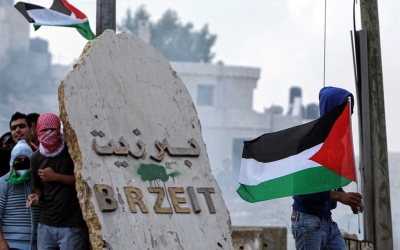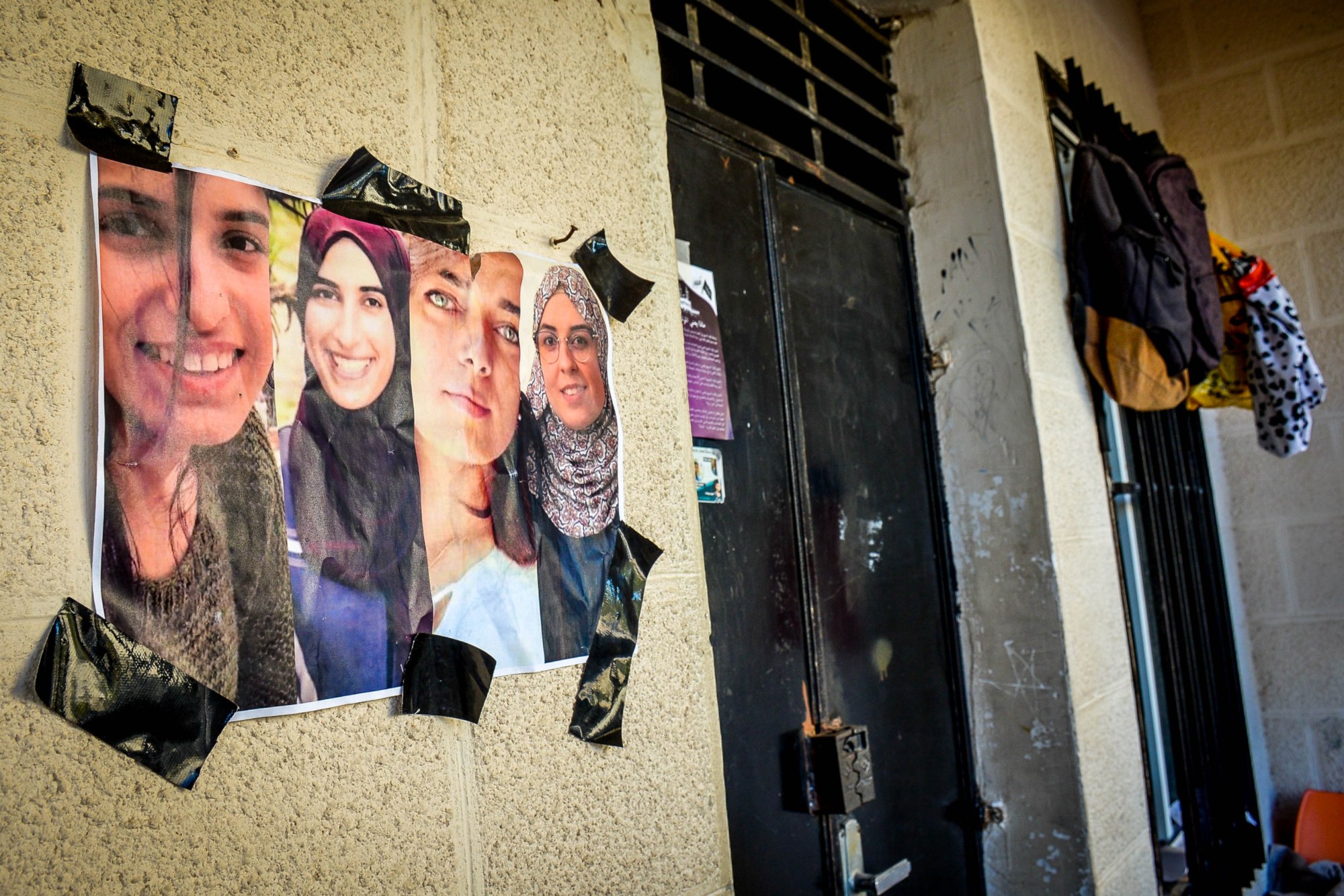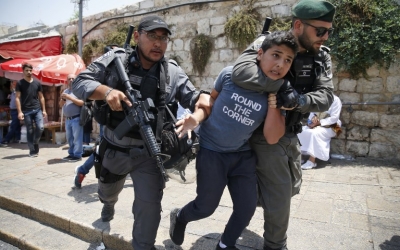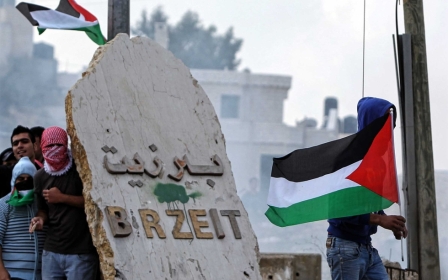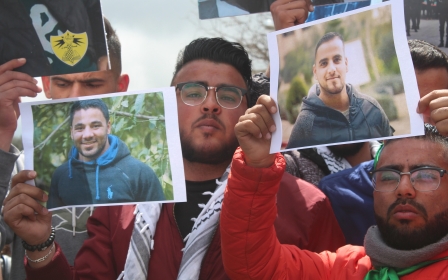'Arrested at any time': Palestinian students in Israel's crosshairs
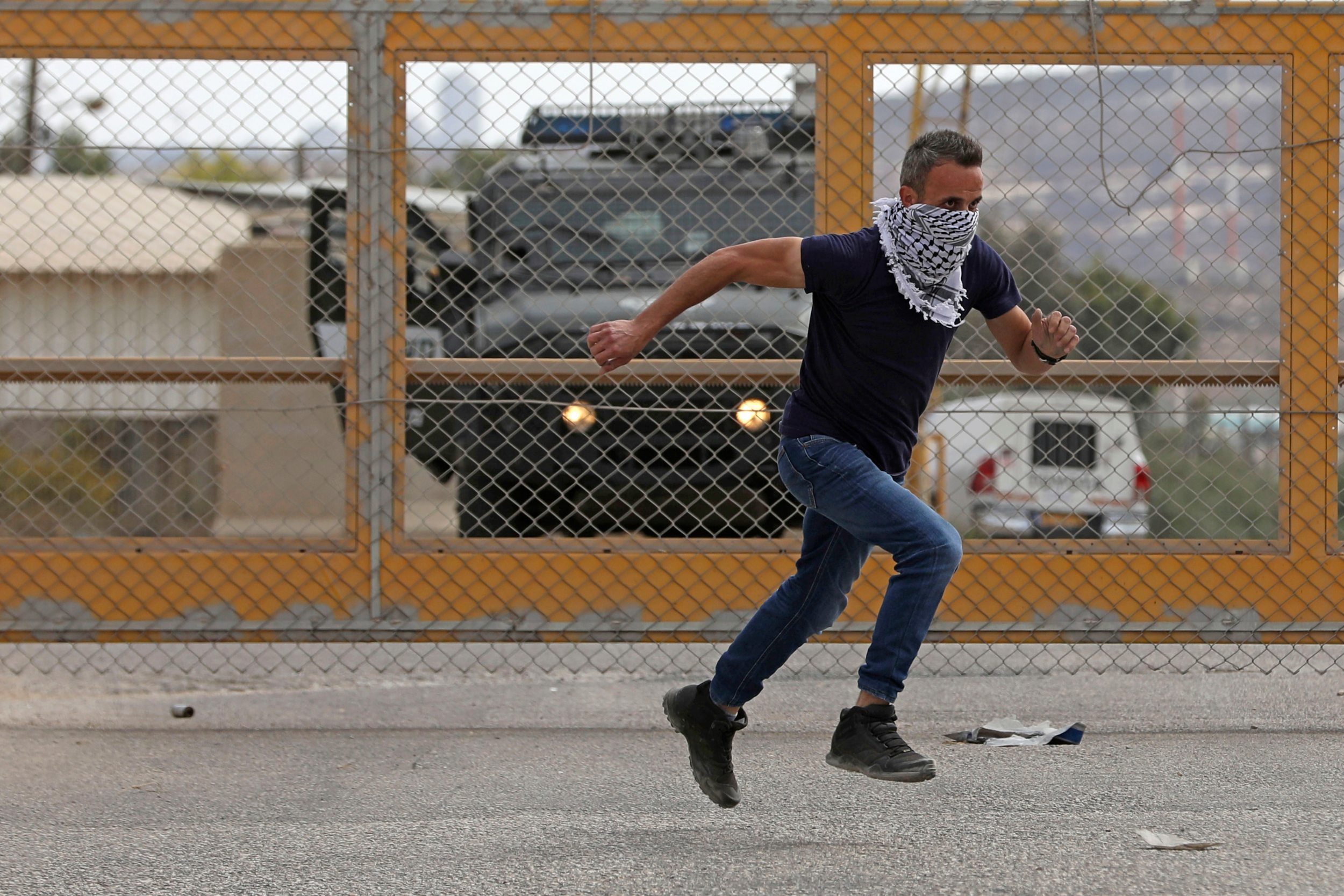
For most students, grades, exams and social commitments are some of life’s biggest preoccupations while at university.
But not so for Hadi Tarshah. At 24, the young Palestinian man has spent the past semester in Israeli prison, and his primary concern is his court hearing in March.
New MEE newsletter: Jerusalem Dispatch
Sign up to get the latest insights and analysis on Israel-Palestine, alongside Turkey Unpacked and other MEE newsletters
Similarly, Mays Abu Ghosh, who is recovering from brutal torture in Israeli custody, is a mere semester away from graduation. And a fellow student Azmi Nafaa has struggled for three years to obtain his diploma from behind bars.
In the last months of 2019, the Israeli occupation has launched one of its most aggressive arrest campaigns against Palestinian students in recent years.
Statistics by Palestinian prisoners’ rights organisation Addameer indicate that some 250 Palestinian university students are currently imprisoned by Israel. According to the Right to Education Campaign at Birzeit University, Israeli forces detained 30 students from the leading Palestinian institution alone over a period of four months.
Since 2015, when a violent wave of contestation emerged in the occupied Palestinian territories, Israel has increased repressive policies against Palestinians.
However, young Palestinians told Middle East Eye that the recent increase was only a continuation of a broader Israeli policy of repression, criminalising Palestinian students who were organising since the very beginning of the occupation.
Breaking morale
Abdel Munim Masoud, a 23-year-old finance student, remembers the last time he saw his friend, Tarshah, in October.
“We were talking and laughing together the night before,” he told MEE. “The next morning, I received a message on my phone saying that the occupation had arrested Hadi at dawn.”
Tarshah has been active in the student movement in Birzeit University since he began his studies there. In April, he participated in the annual debate for the student council elections, becoming a known figure in the student movement.
“We expected him to be arrested at any time,” said Layan Kayed, 25, a sociology student and friend of Tarshah. “But we were surprised because his arrest came at a moment when arrests had stopped.”
'The occupation tries to break the morale of young Palestinians [...] especially those who are politically aware and active'
- Father of detained student Hadi Tarshah
Tarshah’s father told MEE that Israeli forces broke into the family home at 5am.
“They entered the building where we live, breaking five doors before entering our apartment violently, rifles pointing forward,” the man said. “They took Hadi from his bed and gave him no time to dress or even put on his shoes. They put him in a military jeep and left.”
It took two days for Tarshah’s family to find out his whereabouts and learn that he was being interrogated at an Israeli detention centre in Jerusalem known as the Russian compound.
“The occupation tries to break the morale of young Palestinians, especially those who are preparing themselves academically, in order to push them to leave their country - especially those who are politically aware and active,” Tarshah’s father added. “But Hadi is much stronger and much more aware than that”.
Tarshah has already missed an entire semester of classes, which he will have to make up for - but he also faces the very real possibility of repeated detention, which could further derail his education.
“Socially, it is hard to see your friends all graduating while you are still behind,” Masoud explained.
“Some students might find it more difficult to go back to the same level of activism after their release, because they don’t want to miss another semester” Kayed concurred. “But that doesn’t mean they won’t be arrested again. Once you have been arrested, you can be arrested anytime afterwards.”
‘Nowhere is safe’
The most dramatic arrest occurred in March 2018, when undercover Israeli forces - also known as mustarabin for disguising themselves as Palestinians - entered the Birzeit campus to abduct student council president Omar Kiswani.
“At first I thought it was a fight,” said Masoud, who witnessed the incident. “Then they pulled out their weapons and I understood they were Israeli soldiers, not students.”
“Our immediate reaction was to rush to all entrances of the campus and block them to prevent more soldiers from breaking in,” fellow eyewitness Hazem Aweidat said. “They finally reached the main entrance, threatening students away with their weapons, got into a car with Omar and left.”
While Kiswani’s detention in broad daylight attracted plenty of media attention to the case, Aweidat highlighted that university campuses have long been vulnerable to raids by Israeli security forces.
“The campus is not more important than our homes,” he said. “When it is raided, we feel anger, but if we see it as an abnormality we might forget that we are in an occupied country, where nowhere is safe.”
The threat to students goes beyond raids by undercover soldiers. Al-Quds University in the West Bank town of Abu Dis near Jerusalem is one of the places that has suffered from numerous direct, open daylight incursions by Israeli armed forces on campus.
'We, the politically conscious youth in the universities, are the ones leading the streets. That is why the occupation targets us'
- Hazem Aweidat
According to the university’s legal centre, 25 of its students were arrested by Israel during the last semester alone.
The campus’ location near the Israeli separation wall makes it more vulnerable to raids, former Al-Quds University student council member Mohammad Abu Shbak told MEE.
“When students demonstrate following the arrest of one of their own, they tend to march towards the wall,” he explained. “Israeli soldiers then suppress the demonstration, break in on campus tearing down doors and fire tear gas and rubber-coated bullets inside the campus.”
For Abu Shbak, another factor comes into play: “The occupation targets this university because it is the only Palestinian one in the Jerusalem region. They don’t want any Palestinian student activity around Jerusalem.”
Abu Shbak recalled the first incursion he witnessed.
“I was in the students’ council office when I smelt tear gas and heard people running in panic. We split into groups; some went to block entrances, some to help evacuate students and teachers, others tried to secure cars and buses to help people go home,” he said. “It lasted for almost an hour before the soldiers left, leaving chaos behind.”
But it was only after the Israeli soldiers evacuated that Abu Shbak found out one of his friends, second-year student Bahjat Radaidah, had been arrested.
As a result, “more families hesitate to send their children to Al-Quds University because of its proximity to the wall and the incursions of its campus by the occupation,” Abu Shbak said.
Destroying futures
Fortunately for Abu Shbak’s friend Radaidah, he only spent a week in detention. But not all Palestinian students who are arrested are that lucky.
Azmi Nafaa was a 25-year-old law student at Al-Najah University, located in the northern West Bank city of Nablus, and had one semester left before graduation when he was shot, injured and arrested by Israeli forces at a nearby checkpoint in November 2015.
An Israeli military court extended his detention without charges five times - using a widely denounced practice known as administration detention - before eventually charging him with an alleged attack on soldiers and sentencing him to 28 years in prison.
“Azmi decided that he was going to finish his studies in prison. His mother hesitated, but I insisted that the occupation can’t stop our life,” his father, Sahel Nafaa, told MEE.
For months, Sahel struggled with Israeli authorities to allow his son to study.
“I looked on Facebook for information on any prisoner who had a postgraduate degree in law who could help Azmi study,” he explained.
“When I finally found one in the same prison my son was held in, then began the struggle to send him the books he needed. The prison administration wouldn’t allow the books in, and then refused to let me visit Azmi in prison. They wanted to force me to stop trying, but I didn’t.”
'The occupation knows that students are the most active and dynamic sector of society - especially at a time when political parties are less and less effective'
- Layan Kayed, student
Azmi finally graduated while in Israeli custody after three years.
For Sahel, Israel “aims to destroy the future of the Palestinian people, which is why they target the educated young, intimidate their families, push us away from education.”
Kayed also believes that Israel's repression of students is politically motivated:
“The occupation knows that students are the most active and dynamic sector of society - especially at a time when political parties are less and less effective.”
Since the Palestinian Authority (PA) - led by President Mahmoud Abbas’ Fatah party - has not held presidential elections since 2005, student council elections have long served as a barometer of wider Palestinian politics, especially among the younger population.
Although student political factions in Palestine have historically been extensions of the political parties, Aweidat thinks that times have changed.
“Today, political parties are in fact an extension of the student movement. We, the politically conscious youth in the universities, are the ones leading the streets,” he said. “That is why the occupation targets us.”
Fellow students listening to Aweidat nod in affirmation, as Kayed finally concludes: “That’s all part of being a student in Palestine.”
This article is available in French on Middle East Eye French edition.
Middle East Eye delivers independent and unrivalled coverage and analysis of the Middle East, North Africa and beyond. To learn more about republishing this content and the associated fees, please fill out this form. More about MEE can be found here.


